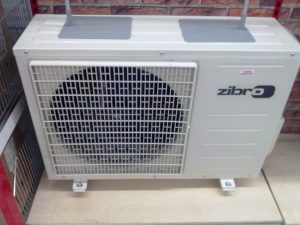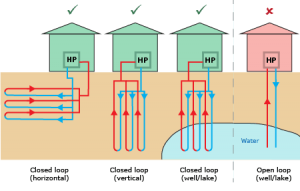Heat Pumps
Below is a list of Companies that supply and install Heat Pumps
Scroll down to visit heat pump contractors in your area.
Some brief information about Heat Pumps.
Heat pumps are a very good alternative source of home heating. Heat pumps are devices that take heat from one location, raise the temperature, and then transfer the upgraded heat to a different location.
Heat pumps can be used instead of or in conjunction with other forms of renewable energy such wood burning stoves for space heating or solar panels for heating water. But overall if you are looking for a consistent form of energy delivery system for your home then look no further than heat pumps.
They come in a variety of different types. They extract heat from different sources. These sources can be from air, ground (geothermal) or water. Heat pumps are normally used to heat the entire home. However, if you simply want to heat a single room then mini split heat pumps is the ideal solution?
The efficiency of your heat pump will depend on the source of energy used and degree of insulation and air tightness of your home. For example if you use geothermal as the source of heat then you will expect a consistent result year-round, whereas air as a source of heat will vary throughout the seasons.
It should be said that a heat pump operates on the sane principal as a refrigerator. This gives heat pumps an added bonus. Heat pumps can be used to cool the inside of a building during the warmer months.
Heat Sources:
Air Source – in this system heat is extracted from the outside air. This is accomplished by use of a fan. The pump will boost the incoming energy and deliver to your home heating elements such as radiators, hot water storage cylinders or underfloor heating.

Air Source Heat Pump
Ground Source or Geothermal Heat Pump – in this system heat is extracted from the ground. The rest of the operation is similar to the air source. Ground source can be quite expensive as it entails looping several metres of flexible pipe and covering with approximately 1 metre of soil. The principal is that the underground temperatures maintain a constant temperature year round. Although the installation costs can be quite high the output efficiency will be much higher than the air source during the colder months. The flexible piping can be either laid horizontally or vertically.
Water Source – this system is very similar to the geothermal except the input heat is sourced from underground water such as groundwater or wells. Costs will be similar to ground source. As illustrated above both the geothermal heat pumps and the water source systems should be a closed loop.

Ground and Water Source heat pumps
Ductless Heating Systems or Mini Split Heat Pumps.
These heat pumps consist of a compressor situated outside the dwelling and an air handling unit situated inside your home. They are used for heating or cooling individual rooms. They are very efficient.
A common way of supplying heat to a heat pump is by taking air from the outside atmosphere. Even cold air has heat energy. However, very cold air will not meet this criterion. The heat pump draws heat from the atmosphere at low temperatures and converts it into high temperature for use in the home. This type of heat pump is known as an Air Source Heat Pump.
Advantages:
- Low carbon emissions at source.
- They are very efficient at converting energy into heat.
- They can be used for both heating and cooling.
- Some types need very little space.
- Lower energy bills.
- Improved building energy rating – BER.
- Lower carbon footprint.
- Air source is relatively easy to install.
- Even lower energy bills can be achieved if you install solar PV or wind generated electricity systems.
- Acceptable renewable energy measure as per Building Regulation 2008.
Disadvantages:
- Initial costs can be high.
- Very dependent on the cost of electricity; this can be offset, to some extent, by introducing solar or wind source electricity into your home.
- Very cold outside-temperatures will affect the operation of the heat pump.
What type is best suited to your needs?
- Apartment dwellers – Air source
- Terrace house – Air source with the caveat that you have some available space for a small heat pump
- Large Flat complex – the best solution would be a large air source heat pump servicing the entire building (This could be difficult to manage if there are multiple owners.)
- House dwellers with large garden – air or geothermal source
- House dwellers with small garden – air source
- House situated on a very large site – air, geothermal or water
- Farm dwellers - air, geothermal or water
- Mobile homes – air source
- Log Cabins – air source or water if situated in rural district
Typical Utility Bills for Heat Pump installations.
For information on energy saving read the following SEAI blog. In this blog there a few case studies. One of these centre’s around a French national now living in south Dublin. He points out the fact that his heating bill was €70 per month for a 50 m² dwelling using electric storage heaters. When he moved to a 130 m² dwelling was also €70 per month albeit for much large space.
Heat Pump Grants.
The SEAI is offering a grant for installing heat pump systems. Check it out here. If your home was built and occupied before 2011 then you could be among the lucky ones. Keep your eyes open for deep-retrofit-grant opportunities. A recent trial just ended but another Deep Retrofit Scheme is likely to be offered in the coming years.
If you want to be kept up to date on Government renewable energy grants use the contact form on the contacts page. Fill in your name, email address with a brief message.
See also the SEAI homeowners guide to heat pump systems




